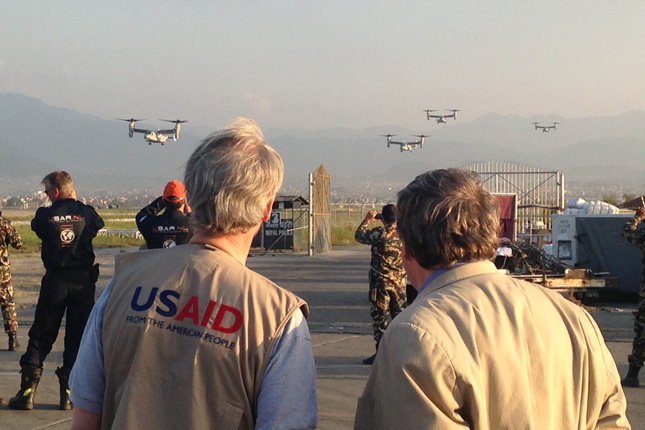-
Security Links: An Emerging Congressional Common Ground on Climate Change?
July 26, 2017 By Lauren Herzer Risi
Earlier this month 46 House Republicans voted with Democrats to protect an amendment in the current National Defense Authorization Act that acknowledges that “climate change is a direct threat to the national security of the United States” and requires the secretary of defense to provide “a report on the vulnerability to military installations and combatant command requirements resulting from climate change over the next 20 years.”
The Langevin Amendment specifies that the report should include a list of the 10 most vulnerable installations in each service, an overview of actions needed to increase the bases’ resilience, and “a discussion of the climate-change related effects on the Department, including the increase in the frequency of humanitarian assistance and disaster relief missions and the theater campaign plans, contingency plans, and global posture of the combatant commanders.”
As regular readers of the New Security Beat know, this isn’t DOD’s first rodeo with climate security connections (see actions in 2010, 2014, 2016). In fact, the amendment quotes high-ranking military officers—including current Secretary of Defense James Mattis and Chairman of the Joint Chiefs of Staff Joseph Dunford—describing the impacts of climate change on military readiness and national security.
“America’s military leaders recognize that climate change acts as a threat multiplier”“America’s military leaders recognize that climate change acts as a threat multiplier, with sea-level rise, drought, and extreme weather leaving vulnerable populations desperate for food, water, and shelter and aggravating the conditions in which terrorism and political and economic insecurity breed, ” says Sherri Goodman, former under-secretary for defense (environmental security) and current Wilson Center fellow.
However, given the United States’ withdrawal from the Paris Agreement, the bipartisan Congressional resistance to efforts to block the amendment is significant, and a clear win for both the climate and security communities.
While increasing the military’s readiness to respond to the threats posed by climate change is an important step, we will need other government actors to prevent those threats from endangering American lives and our national security. Without similar bipartisan support for a whole-of-government approach, climate change’s impacts on fragile states will quickly outstrip and outpace the military’s ability to respond. The other two “D”s–diplomacy and development–in the “3Ds” of foreign policy are essential to tackling the climate change and security nexus.
Already, we are seeing climate effects both at home and abroad, including more severe and more frequent extreme weather events and changing patterns of precipitation, leading to floods, famine, and displacement. These effects are felt most acutely in some of the world’s most vulnerable places, like Syria and the Sahel, where institutions are weak and leaders are unable or unwilling to respond to these crises.
USAID and the State Department—the U.S. government agencies that lead development and diplomacy—need to be part of the American response. Working with other governments, IGOs, NGOs, and communities, this coalition can increase the resilience of vulnerable populations, making them better equipped to adapt to climate change and withstand shocks and stressors.
“Addressing climate change’s myriad impacts will require the broadest of efforts”According to Geoff Dabelko, senior advisor to the Environmental Change and Security Program and professor at Ohio University, “These baby steps in healing the partisan divide on climate change are positive, as the security community does not have the luxury to add or drop threats to security when control of Congress or the White House changes hands. Finding common ground on climate change in a security context can be valuable political terra firma. However, addressing climate change’s myriad impacts will require the broadest of efforts, exactly opposite the dominant federal direction in 2017.”
Military leaders recognize the need for these partnerships. Earlier this year, more than 120 retired admirals and generals advocated for strengthening diplomacy and development in a letter to Congress. “The military will lead the fight against terrorism on the battlefield,” they wrote, “but it needs strong civilian partners in the battle against the drivers of extremism – lack of opportunity, insecurity, injustice, and hopelessness.”
As DOD stated in the 2014 Quadrennial Defense Review, “The military is just one of many tools we as a nation have to protect our national interests. Whenever possible, we seek to pursue these interests through diplomacy, economic development, cooperation and engagement, and through the power of our ideas.” The review also notes that the effects of climate change “will aggravate stressors abroad such as poverty, environmental, political instability, and social tensions – conditions that can enable terrorist activity and other forms of violence.”
A military response to climate-related instability should not be the only tool we pull out of the box. The bipartisan support of the Langevin Amendment is an important first step in building a shared consensus on climate’s security risks. It will have even greater impact paired with support for improving climate adaptation in fragile states, so that our military will not be the primary agency on the front lines of fighting a changing climate.
Sources: Climate Change, Ohio University Voinovich School of Leadership and Public Affairs, U.S. Agency for International Development, U.S. Department of Defense, U.S. Global Leadership Coalition, U.S. House of Representatives
Photo Credit: U.S. Department of Defense Ospreys arrive at Tribhuvan International Airport in Kathmandu, Nepal, to help in USAID humanitarian missions, including aid delivery, May 2015, courtesy of the U.S. Department of State/USAID/Natalie Hawwa
Topics: climate change, conflict, Congress, environment, environmental security, featured, military, QDR, security, State, U.S., USAID
 A Publication of the Stimson Center.
A Publication of the Stimson Center.



